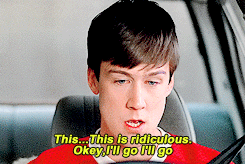Alright, alright, alright. I give in.
I, for one, am tired of being bombarded by people's opinions on
vaccinating children versus not vaccinating children. ...But if you
can't beat 'em, join em?
Okay, not really, but this week's post
does have to do with anti-vaccination beliefs as they relate to
ableism, consciously or unconsciously. This week's post does NOT
weigh in on either side, either has pro- or anti-vaccination. This is
not the venue for individuals (like, for instance, me) to make claims
that could be mistaken as representative of the views of Mt. Hood
Kiwanis Camp and MHKC @ PSU as organizations. But after reading an
essay by Sarah Kurchak, I thought that this
aspect of the dead-horse of a debate might be worth bringing up.
But if
you want a Valentine-y themed blog, click here. :)
Now,
here we go:
In her
essay, Kurchak, who has autism herself, argues that many people are
choosing not to vaccinate their children because they see autism as a
worse fate than illness that, in certain circumstances, could lead to
death.
The
notion that vaccines leads to autism was perpetuate by Andrew
Wakefield, whose infamous study linking autism to the MMR (measles,
mumps, and rubella) galvanized the anti-vaccination panic in 1998. In
2004, that study came under heavy scrutiny, and in 2010, the study
was fully retracted, and Wakefield was found to have altered and
misrepresented the medical histories of his subjects. He subsequently
lost his license. Since then, no scientist has been able to replicate
the results of his...study, and major studies by the Journal of
Pediatrics and the Institute of Medicine have not found any links
between autism and vaccination.
Still,
the subject comes up time and time again, and because of celebrity
endorsements (last year, Jenny McCarthy was all over the internet
with claims that harmful toxins in vaccines lead to autism), the
issue gets a lot of media perpetuation. Again, I'm sure everyone and
their dog has at least some sort of half-hearted opinion about
whether people should vaccinate their children or not, but the thing
that Kurchek (and I) are concerned with is the menacing light cast
upon autism throughout this debate.
Autism
is not a monster. It's not a plague. It's not a mar on the otherwise
pristine crystal that is, surely, the human race.
 |
| Monter-baby from David Lynch's "Eraserhead" - NOT Autism |
People
may accept autism, but they don't want it to be an active part of
their lives. And I don't think they should be blamed for that. Those
who have people with ASD in their lives know what joy and insight
those folks contribute and likely wouldn't exchange that experience
for anything. But can those who don't know be blamed for not wanting
a child with autism? I'm not sure, but at what cost (and with what
evidence) are these “preventative” acts being taken? According to
Kurchek:
“Through no fault of their own, unvaccinated children, immunocompromised people, babies too young to receive the vaccination and the occasional vaccinated person (no vaccine is 100 per cent because science is not magic) across the continent are suffering from an infection that was essentially eliminated from the U.S. in 2000. All because a sizable group of mostly-privileged parents have decided that reviving a group of life-threatening diseases and potentially inflicting them on their loved ones and neighbors is infinitely preferable to having an autistic child. …
… Someone who refuses to vaccinate their children because they’re afraid of autism has made the decision that people like me are the worst possible thing that can happen to their family, and they’re putting everyone at risk because of it. I’ve been told by some anti-vaxxers that they don’t mean my brand of autism; they mean non-verbal autism, or as they are so fond of calling it, 'profound autism.' I’m not about to take any solace in the idea that they’re willing to make exceptions for autistic people who can perform as neurotypical.”
So there's that. Whether for or against
vaccination, both sides should maybe look at the implications of the
argument—implications that go beyond medical issues or freedom of
choice or public health and into the world of individuals with autism
who exist as expemplifying subjects for people living in an ableist
world.




No comments:
Post a Comment